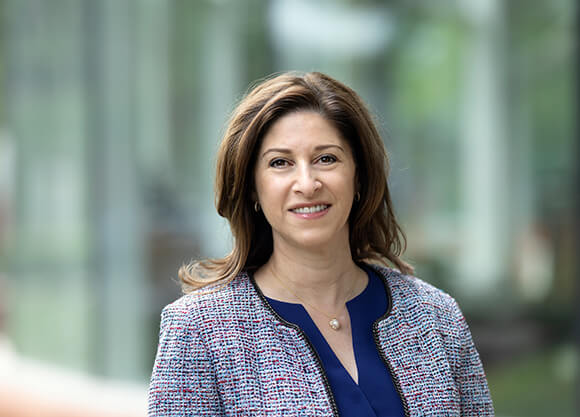
Business dean defines community approach to leadership
February 07, 2024

February 07, 2024

The enthusiasm of the School of Business faculty for renewal, innovation, and growth, combined with the beauty and sophistication of Quinnipiac’s campuses, made her decision to make Quinnipiac her new home an easy one, Dean Raider said in a recent conversation with the “Deans Counsel” podcast.
The 33-minute in-depth podcast focused on how Dean Raider’s community approach led the school through the challenges of a pandemic and propelled them into a new era of transformation.
Dean Raider spoke about how she prioritized meeting with each faculty and staff member in a one-on-one session, usually going to their office.
“I didn’t want it to be dean-centric,” she explained. “I wanted to learn about them in their own spaces. You learn about people from office anthropology: about their families and from the artifacts that capture their passions and imaginations.”
In addition to faculty, she also met with every staff member — and did a lot of listening.
Along the way, Dean Raider also convened small group luncheons which accomplished another key goal: to begin “normalizing coming back to campus and being in-person with one another again and to help people reconnect,” she said.
Speaking of connections, Dean Raider highlighted the benefits of the School of Business’ extensive alumni network in her podcast.
“One of the greatest opportunities we have is to build upon our community of alumni,” she said. “We have phenomenally placed alumni.”
“We have long punched above our weight in alumni placement with senior folks at BlackRock, Abbott, Goldman Sachs, Morgan Stanley, for example,” she said. This creates opportunities for mentorship as well as gaining insights about the frontiers of the finance sector, insights that fuel program innovation such as the school’s new financial technology major.
Quinnipiac’s annual GAME Forum — the world’s largest student-run financial conference — is another way the Quinnipiac School of Business punches above its weight class.
She also heralded a new School of Business building as a major step and differentiator among competitors, especially in a post-pandemic world.
Dean Raider was part of the team that broke ground on the new facility last year.
The new School of Business building, set to open in May 2025, considers the needs of its future students and faculty—including students who have not yet even applied.
“We are thinking about what kind of spaces they are looking for,” she said, asking, “How can that building itself be a way of strengthening our community and bringing people back to our campus?”
The planning of the building is itself an opportunity to bring the community together around a shared goal.
Dean Raider estimates that there have been more than 20 focus groups considering many important matters, including what spaces are needed and how they will be used.
Every detail — from a new interdisciplinary behavioral marketing lab to a new place for the Quinnipiac community to enjoy lunch or a cup of coffee — has been considered.
The design of the building reflects the values of our school, she said.
Originally, the dean’s suite, for example, was planned to go at the entrance of the building but Raider was concerned it may make it more challenging for students to find career guidance — and so she moved the dean’s suite to accommodate the needs of her students.
Dean Raider emphasized that Quinnipiac is uniquely positioned to offer business students much more than just a business education.
Excellence in business education means going beyond the table stakes of just teaching business acumen but offering a holistic education that can include the arts, humanities, sciences, healthcare, and engineering, she explained.
At Quinnipiac, she emphasized, students can major and minor across the university, something unusual for a school of its size.
“Business education needs to go to a place where we recognize today’s young folks—those 12- or 13-year-olds—when they go into the world with titles like metaverse planner and algorithm bias auditor, we need to have a curriculum and experience that enables them to thrive in rapidly changing environments,” she said. “It’s changing technology, economically, and culturally.”
To navigate that, Quinnipiac needs a holistic combination of technical skills and the human skills that set it apart.
“People are so interested in combining deep passions in what they learned as a sociology or history major with the practical applied skills that you get out of business education,” she said. “Quinnipiac is a phenomenal place to do that.”
Quinnipiac Today is your source for what's happening throughout #BobcatNation. Sign up for our weekly email newsletter to be among the first to know about news, events and members of our Bobcat family who are making a positive difference in our world.
Sign Up Now